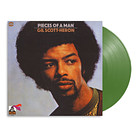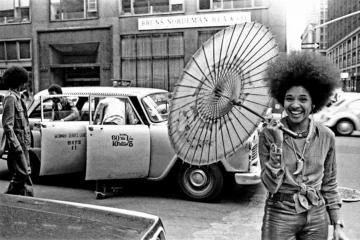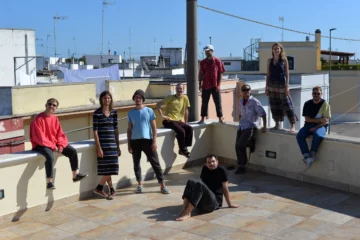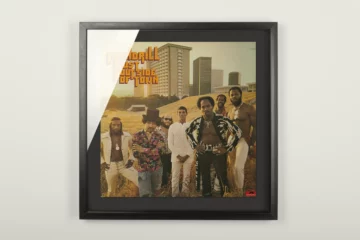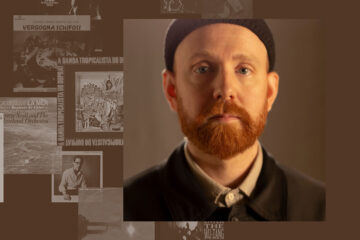Man comes into the world, lives, and dies. No one leaves this cycle, no matter how great the need to break it. That is why man tells where he comes from and how he lives — with his words, with his actions and in response to the experience of his own finitude. Gil Scott-Heron, who was born in Chicago in 1949 and died in New York in 2011, told a lot in his 62 years of life. Of a nation built on the cornerstones of racism and false promises. Of a future in which the political empowerment of his »brothers« and »sisters« becomes a reality. And of children who will one day be better off because they will no longer be killed because of the colour of their skin.
Scott-Heron was born to a black opera singer and a Jamaican footballer. His parents separated and he grew up with his grandmother in Kentucky. At home he listened to Billie Holiday records, at school he was one of the few »non-whites«, where discrimination against his skin colour was as deeply rooted as the Second Amendment in the skulls of rednecks. Only his escape from the South to New York lead to a revelation. In Harlem, Scott-Heron met beat poets like Amiri Baraka, who was one of the central figures of the African-American civil rights movements at the end of the 1960s. When Martin Luther King Jr. was assassinated on 4 April 1968 and over 100 cities went up in flames, Scott-Heron sat in hins dorm at the campus of Lincoln College in Pennsylvania. He wrote down what he saw, what he heard. And what he imagined: »The revolution will not be televised«.
With »The Revolution Will Not Be Televised«, Gil Scott-Heron slammed a mirror in the faces of a nation too busy with hyper-capitalist consumption to care about revolution.
At Lincoln College, Scott-Heron met the highly talented Brian Jackson. While one tinkered with lyrics, the other sat at the Rhodes piano and played: Funk, jazz, R’n’B. Scott-Heron got the opportunity to set his poems to music, which, anyway, followed an inner rhythm, juggled with words — and told of a reality that does not flicker across the screen at prime time. As a history and politics student wearing a huge Afro at the time, he absorbed the pop cultural references of the 1960s, and put them to a political protest music of the 1970s. After publishing his first novel, »The Vulture«, at 20, his phone rings. At the other end of the line is Bob Thiele. The man who three years earlier had written a world hit with »What A Wonderful World« and worked with jazz greats like John Coltrane wanted to see him in the studio. It was time for the revolution.
Thiele had founded Flying Dutchmen Records shortly before and got Scott-Heron his first record deal. In 1970, a live recording from a New York basement club was released. With only conga accompaniment, Scott-Heron recites a song that was about to make him famous and to be further produced on his first studio recording in 1971 as an anti-capitalist anthem. With »The Revolution Will Not Be Televised«, he slammed a mirror in the faces of a nation too busy with hyper-capitalist consumption to care about revolution. Some saw the song as a threat to revolt, to break away from an apathetic public, which Scott-Heron as a »muckraker«, as a scandal-maker, forcibly evoked. But the author disagrees. The song, he says, was a call to the black community to get the obsession with American materialism out of its head to deal with social and political issues instead.
It is evident that Gil Scott-Heron had a talent for packaging socio-political issues into songs that didn’t sound like a master’s seminar in political theory, but could lead to sign up for one.
»At the same time, it was satire,« Scott-Heron explains years later. »People tried to argue that there was a militant message in the song,« he tells Brad Schreiber, author of »Music is Power«. »But how militant can you really be when you sing, ›The revolution won’t make you look five pounds thinner?‹« In this statement, it is evident that Scott-Heron had a talent for packaging socio-political issues into songs that didn’t sound like a master’s seminar in political theory, but could lead to sign up for one. After all, you have to change your thinking before you can change your life, Scott-Heron said, because »revolution is not a thing that just happens overnight.« If this desire sounded like anger, it was only because it was preceded by sorrow and suffering. From the album’s title song to its anthemic homage to »Lady Day and John Coltrane« to »The Prisoner«, the nine-and-a-half-minute ballad, the 21-year-old Scott-Heron roamed through gloomy backyards and personal abysses. The disappointment of a world that does not change collided here unconditionally with the powerlessness of the individuals who do not want to change it.
Scott-Heron at no point held back his despair but poured it out to seek the possibility of change within himself — and to lead others in the same direction. It is a non-violent catharsis, an offer to reflect, an opportunity for inner change to follow outer ones. Listening to »Pieces of a Man«, you would never think of abruptly pulling a bandana over your face to loot the nearest Walmart. The album does not ignite any Molotov cocktails, because anger would not provide any drive, would fizzle out too quickly and turn into a suppressed sadness. Rather, one feels the pain that Scott-Heron revealed as if he were handling a cut open ribcage. The potential of this record is based on the level of emotionality that leads from private disappointment to public vulnerability. This is where one finds its topicality. More than 50 years after its release, one still must face this pain. Much has happened, but nothing has changed. Not yet, Scott-Heron would say — because there is still much to tell.
